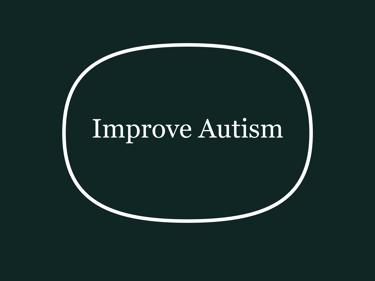Efficacy and safety of Bacteroides fragilis BF839 for pediatric autism spectrum disorder: a randomized clinical trial
Authors:
Lin, C.H., Zeng, T., Lu, C.W., Li, D.Y., Liu, Y.Y., Li, B.M., Chen, S.Q. and Deng, Y.H.
Summary of study
In this study children were given 10g of acteroides fragilis BF839 (a strain of probiotic) twice a day for 16 weeks which showed improvement of sterotypical behavior in children with autism with additional benefits in overall autism severity and gastrointestinal symptoms in those with more severe autism (CARS ≥30).
Significant improvements were evident after 16 weeks, highlighting the need for a sustained intervention period. Probiotics offer a safe, non-invasive option with potential gut and behavioral benefits, though their efficacy may depend on the strain, individual characteristics, and further research is needed to solidify their role in autism treatment.
Findings from the Study
The study involved 60 children aged 2-10 years with ASD, randomly assigned to either a probiotic group (receiving Bacteroides fragilis BF839) or a placebo group (receiving maltodextrin). The intervention lasted 16 weeks, with assessments conducted at baseline (day 0), week 8, and week 16. The primary outcome was the Autism Behavior Checklist (ABC) scores, while secondary outcomes included the Childhood Autism Rating Scale (CARS), Social Responsiveness Scale (SRS), S-M (social skills measure), Gastrointestinal Symptom Rating Scale (GSRS), and changes in the fecal microbiome. Safety was monitored through adverse events.
Key Results
Correlation Between Symptoms: There was a significant positive correlation between ABC scores (autism behaviors) and GSRS scores (gastrointestinal symptoms), indicating that more severe autism behaviors were associated with more severe gastrointestinal issues.
Overall Improvements: After 16 weeks, both the BF839 and placebo groups showed improvements in ABC total score, CARS score, and SRS score compared to baseline, likely influenced by ongoing rehabilitation training and natural developmental progress. However, the BF839 group exhibited specific advantages over the placebo group.
Primary Improvement: The BF839 group showed a statistically significant improvement in the ABC body and object use score (reflecting stereotypical behaviors) compared to the placebo group at week 16 (-4.68 ± 6.29 vs. -1.07 ± 5.73, p = 0.026).
Subgroup Analyses:
Age <4 Years: In children under 4 years, the BF839 group had a significant improvement in the ABC body and object use score compared to the placebo group at week 16 (-4.85 ± 4.60 vs. 1.50 ± 3.87, p = 0.001).
Baseline CARS Score ≥30 (More Severe Autism): In this subgroup, the BF839 group showed significant improvements at week 16 compared to the placebo group in:
ABC total score (-19.71 ± 24.12 vs. -5.05 ± 16.58, p = 0.047),
ABC body and object use score (-5.71 ± 8.26 vs. -0.32 ± 5.88, p = 0.034),
CARS score (-5.57 ± 5.79 vs. -2.11 ± 3.70, p = 0.044),
GSRS score [-3.50 (-7.13, -1.25) vs. 2.00 (-3.00, 3.00), p = 0.014].
Gut Microbiota Changes: The BF839 group showed significant changes in microbiota composition at week 16, including increased abundance of beneficial bacteria (Bifidobacterium pseudocatenulatum, Bifidobacterium longum, Bifidobacterium bifidum) and decreased abundance of potentially harmful bacteria (Clostridium perfringens, Bacteroides thetaiotaomicron). Metabolic pathways related to neuroactive compounds (e.g., sucrose degradation, valine degradation) also increased, suggesting a possible mechanism for behavioral improvements.
Safety: The intervention was generally safe, with only two participants in the BF839 group withdrawing due to mild diarrhea (adverse event rate: 6.67%). No other significant adverse events were reported.
What Probiotics Were Given and How?
Probiotic: The probiotic used was Bacteroides fragilis BF839, a non-toxic intestinal symbiotic bacterium.
Administration: It was administered as a powder in bars, with each 10g bar containing at least 10^9 colony-forming units (CFU) of viable bacteria. Participants took one bar twice daily with warm water for a total of 16 weeks. The placebo group received maltodextrin in an identical format to maintain blinding.
What Symptoms of Autism Were Improved, If There Were Improvements?
Improvements were observed in the BF839 group, with specific symptoms varying by subgroup:
General Population: The BF839 group showed a significant improvement in the ABC body and object use score, which measures stereotypical behaviors (e.g., repetitive movements or object use), compared to the placebo group at week 16.
Subgroup with More Severe Autism (CARS ≥30):
ABC total score: Improved, indicating a reduction in overall autism symptom severity.
ABC body and object use score: Improved, reflecting reduced stereotypical behaviors.
CARS score: Improved, indicating reduced autism severity as assessed by clinicians.
GSRS score: Improved, showing alleviation of gastrointestinal symptoms (e.g., constipation, diarrhea, abdominal discomfort), which are often linked to autism severity.
No Significant Improvement: In children with less severe autism (CARS <30), no significant differences were observed between the BF839 and placebo groups, suggesting the probiotic’s effects may be more pronounced in severe cases.
https://pubmed.ncbi.nlm.nih.gov/39290561/
doi: 10.3389/fnut.2024.1447059


